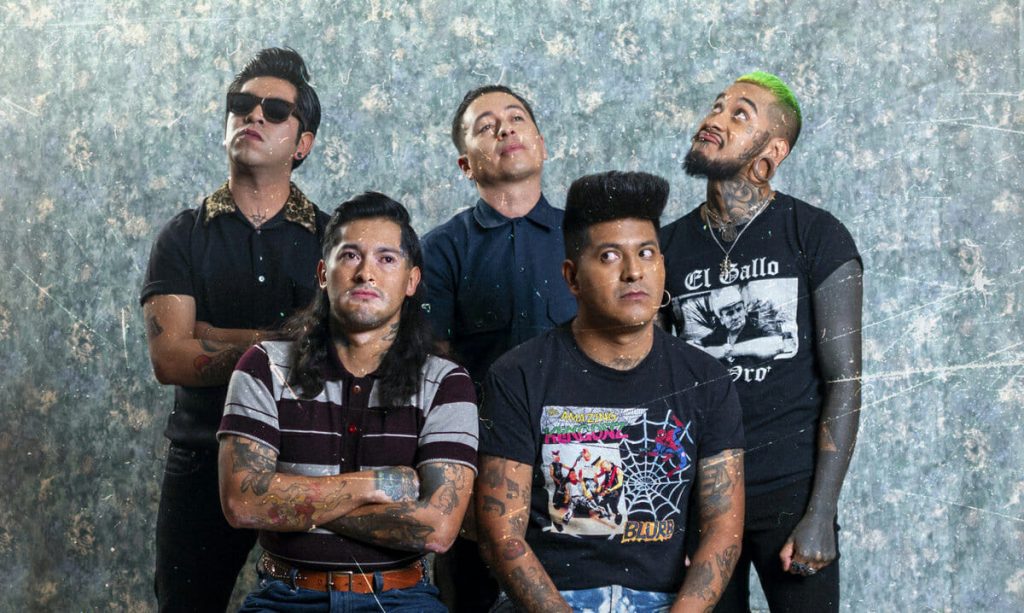
The palatial grand pavilion of David Geffen Hall in New York’s Lincoln Center is probably one of the last places that you’d expect to find a heavily tattooed group of marimba-banging Mexican cumbia punks performing. But that’s where Son Rompe Pera’s five members were displaying their unique hybrid of tropical marimba riffs and hardcore energy earlier this year during GlobalFest’s annual showcase of old and new international sounds. And if their T-shirts proclaiming “Cumbia is the New Punk” weren’t enough, Son Rompe Pera’s new Chimborazo demonstrates why any billionaire-funded venue should consider itself lucky to host them.
Launched just outside of Mexico City in 2001 by the late José Gama Sr., known as Batuco, Son Rompe Pera began as a traditional neighborhood marimba band available for weddings, family parties and whatever else could pay the bills. The band’s moniker refers to the boisterous ways of Batuco’s spouse, Esperanza, and sons Kacho, Mongo and Kilos were drafted into the family business as children. Customers hired the group right off the street in their tough, working[1]class neighborhood, and the Gama lads were expected to perform five-hour shows— heavy on popular rancheras, norteñas and cumbia classics— without any complaints.
Later, as rebellious teenagers, the boys pushed back against the marimba scene in favor of the more visceral pleasures of punk, psychobilly and ska. They were collectively on the verge of giving up the marimba entirely following their father’s death in 2016, when a rewarding collaboration with Aldo “Macha” Asenjo, leader of Chilean cumbia kings Chico Trujillo, opened their eyes to the possibility of doing something completely different with the mellow mallet instrument.
“In 2017, we went to Chile and stayed with Macha,” recalls Kacho in Spanish, interpreted by band manager Timothy “Timo” Bisig. “It was an eye[1]opener and the first time we realized we could combine marimba and cumbia with rock. In Mexico City, punks couldn’t imagine their music played with marimba, while our dad couldn’t imagine marimba with punk.” Thus, Son Rompe Pera 2.0 was born.
Fortunately, the Pan-American dance music known as cumbia has long been flexible enough to integrate nearly any mutation. A laid-back Santiago recording session resulted in Son Rompe Pera’s 2020 debut album, Batuco. It consists of nine cumbia, ranchera, pachuco and ska-punk covers, as well as a single original. The band began touring with ska fusion groups such as Panteón Rococó and Fishbone, and it eventually became time to reveal Son Rompe Pera’s real sound to the world.
Reversing Batuco’s ratio, Chimborazo exclusively contains originals, but for a token cumbia cover. Surprisingly, the members of Son Rompe Pera had never previously written anything themselves, despite having some 500 songs in their repertoire. Kacho, 32, wrote most of the music, and Mongo, 34, most of the lyrics. The brothers also share the band’s single marimba onstage, dividing it into melody and bass parts. Kilos rocks percussion, while longtime friends Ricardo Lopez (drums) and Raúl Albarran (ukulele, bass) help make the music go bang.
Chimborazo arrives on AYA Records, a new imprint of the Buenos Aires label ZZK, a longstanding font of mind[1]bending cumbia psychedelia. The title honors a street where both Kacho and Mongo lived at different times. “It’s where our lives moved from one point to the next,” Kacho says. “It’s a cool-sounding word.” Mario Galeano, leader of Bogotá, Colombia, cumbia experimentalist Frente Cumbiero produced the album.
Throughout Chimborazo, punk-rock tempos oscillate with lilting marimba grooves. It’s a family affair, from the congenial dance rhythm of “Cumbia pa tu Madre” (Cumbia for Your Mother) to the opulent horn and percussion textures of the album-closing instrumental, “Batuco.” But Son Rompe Pera display their cumbia-meets[1]Misfits ambitions most grandly in “Chucha” and “Proteus,” psychedelicized sagas in which Mongo respectively chronicles a nocturnal alien abduction and his death-defying bout with a rare genetic condition.
Barbès Records founder Olivier Conan, an aficionado of twisted cumbia in his own right, has helped bring the band north to play some East Coast shows. “They’re musicians with inquiring minds who invented their own style, their own genre, based on whatever they like,” he says. “They play serious music you can dance to—music that’s really fun. It’s not so-called ‘world music’ by any stretch of the imagination. It’s music for their own market.”
Musical traditions are fragile things that increasingly take careful maintenance to preserve. The Mexican marimba tradition Son Rompe Pera emerges from has African origins and took root in the state of Chiapas, where you can dance to the sound of two, three, sometimes even five men playing a single instrument in any number of town squares. “If you learn how to play the marimba, you also learn how to take care of the marimba,” Kacho says. “It’s a delicate instrument, and no one can help you take care of it except other marimba players. So you learn how to deal with it yourself.” And if that entails kicking out the jams as well, then so be it.
